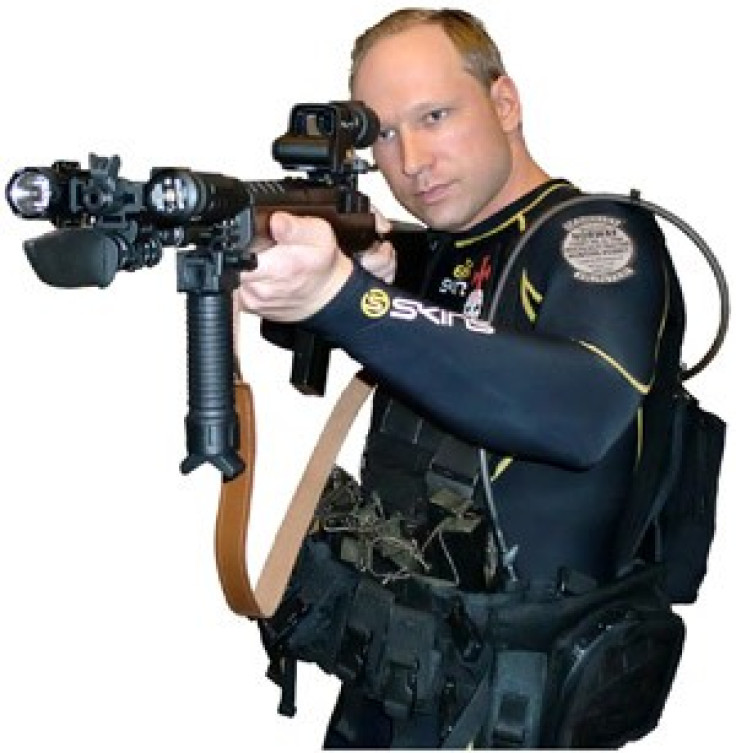Norway Massacre: Could Breivik Have Accomplices Still on the Run?

Norwegian police are investigating claims by Anders Behring Breivik, who has admitted carrying out Friday's twin attacks in Norway that he has "two more cells" working with him.
Mr Breivik made the claim as he attended his first court hearing following the bombing in Oslo and a massacre on an island youth camp that killed at least 93 people in total.
Mr Breivik said his attacks were a "shock signal" to Norway's people.
Mr Breivik, who will be he held custody for eight weeks, will be held in full isolation for the first four weeks at the request of police.
Judge Kim Heger agreed to the demand of the police and said Mr Breivik could receive no letters, nor have visitors except for his lawyer.
Judge Heger said police must be able to fully proceed with the investigation into Mr Breivik's claims without the accused being able to interfere.
Mr Breivik has been charged under the criminal law for acts of terrorism. The charges include the destabilisation of vital functions of society, including government, and causing serious fear in the population.
The judge said Mr Breivik had admitted carrying out the attacks but had not pleaded guilty to the charges.
Judge Heger had earlier ruled that the hearing should be held behind closed doors.
He had said: "It is clear that there is concrete information that a public hearing with the suspect present could quickly lead to an extraordinary and very difficult situation in terms of the investigation and security."
"The accused has made statements today that require further investigation, including that 'there are two more cells in our organisation," Mr Heger told a news conference.
Breivik told the court that he acted to save Europe from Islam.
While the gunman has previously said he had acted alone, he today spoke of potential accomplices.
Earlier, a spokesman for the Oslo court said the judge decided to hold a closed hearing for Breivik (32) on a request from police.
After Judge Heger made the decision, the court issued a statement. "Based on information in the case the court finds that today's detention hearing should be held behind closed doors," it said. "It is clear that there is concrete information that a public hearing with the suspect present could quickly lead to an extraordinary and very difficult situation in terms of the investigation and security."
Breivik had asked for an open hearing at which he wanted to dress in uniform.
It now seems clear that he was looking for a platform to express his belief that Europe must be saved from what he describes as Muslim colonisation. He has also said that the killings themselves were "marketing" for the manifesto he wrote.
The court acknowledged that there was a need for transparency in the case and that it normally would consider arguments from the press when making decisions to close hearings but said that wasn't possible "for practical reasons."
Breivik has confessed he was behind a bombing in central Oslo and the shooting massacre at a youth camp outside the capital, which together killed 93 people, but denies criminal responsibility. In his manifesto and comments to his lawyer, he has said he wanted to start a revolution to inspire Norwegians to retake their country from Muslims and other immigrants. He blames liberals for championing multiculturalism over Norway's "indigenous" culture.
Typically, the accused is brought to court every four weeks while prosecutors prepare their case, so a judge can approve his continued detention. In cases of serious crimes or where the defendant has admitted to the charges, longer periods of detention are not unusual.
While the search for more victims continues in Norway, French police are searching the suspect's father's home. About a dozen officers surrounded the house in Couranel in southern France, entering and leaving at irregular intervals.
The regional gendarme service confirmed the house was that of Anders Behring Breivik's father but would not comment on the search operation; however news reports have said Breivik's father, Jens Breivik, has not been in touch with his son in many years.
Clearly, Breivik wants his name to be known and talked about, so are his claims he did not act alone just another fantasy or could the gunman's accomplices really be on the run?
© Copyright IBTimes 2024. All rights reserved.





